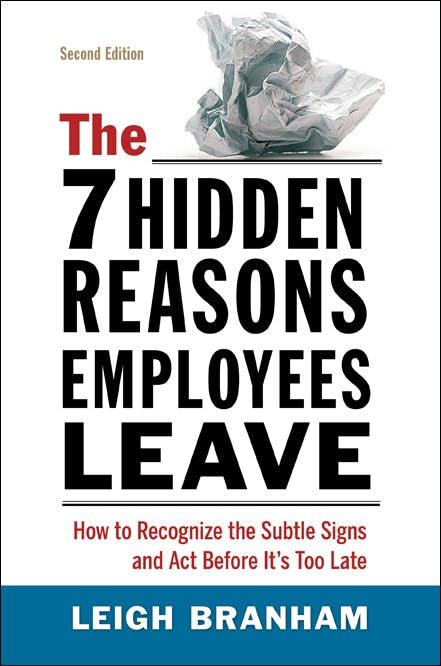By Leigh Branham
The greatest obstacle to discovery is not ignorance — it is the illusion of knowledge —Daniel Boorstin
It was almost six weeks since Anna had resigned her position with her former employer, but it was obvious that strong feelings were still stirring inside her.
“I was thrown into the job with no training. I asked for some one-on-one time with my manager to go over the project inside out, but he never had the time. I sensed he didn’t really know enough to be able to thoroughly brief me, anyway.
Why you should listen when employees’ leave
“When I got feedback that certain work wasn’t acceptable, he wouldn’t be specific about how to correct it in the future. … He actually enjoyed intimidating people, and he had a terrible temper — he would ask me a question and, if I didn’t know the answer, he would make fun of me in front of my co-workers. As it turns out, he wasn’t following the right work procedures himself.
“Later, when I was working way below my skill set, I was told they weren’t ready to give me a promotion, even though I had mastered everything. Finally, when I resigned, they didn’t seem interested in why I was leaving. There was no exit interview. They never listened to me when I was there, and they certainly didn’t care to listen when I left.”
Anna went on to say that she loved her management position with her new employer: “I’m still doing what I love to do, but in a much more professional environment. There’s open communication and no game playing. I know where I stand with them at all times.”
One more thing — Anna went on to mention that she had hired away a talented colleague from her former company.
In the post-exit interviews I do for client companies with employees they regretted losing, these are the kinds of stories I hear. I know there are two sides to every story and that Anna’s former manager might tell it differently. But I also know that there is truth in Anna’s story, and in all the stories I hear — more truth than many were willing to tell their former employers when they checked out on their last day of employment.
 The good news is that some companies do wake up and realize it’s not too late to start listening to both former and current employees.
The good news is that some companies do wake up and realize it’s not too late to start listening to both former and current employees.
Some grow alarmed at the sudden departure of highly valued workers who leave over the course of a few weeks. Others become concerned about protecting their reputation as a desirable place to work, and most simply want to make sure they have the talent they need to achieve their business objectives.
Why many managers don’t care
The fact is that many managers and even senior executives simply don’t care about why their employees are leaving. Their attitude seems to be, “If you don’t like it, don’t let the door hit you in the backside on your way out!”
If this sounds familiar, it should, because it describes the prevailing mindset of most managers in American companies today. Most are overworked, and many are frustrated by their inability to meet the demands of the current workforce, much less do exit interviews.
And, increasingly, human resource departments are so understaffed that they have little time to do more than ask departing employees to complete perfunctory exit surveys on their last day.
You care about preventing turnover, or you wouldn’t be reading this book. So why do you care? Why even take the time and effort to uncover the real reasons employees leave? It would be much easier just to accept what most employees say in exit interviews. You know the usual answers — “more money,” “better opportunity.”
There are many ways to rationalize the loss of talent:
- Who has time to stop and wonder why they left, anyway? They’re gone.
- They didn’t want to be here, so why worry about what they think?
- They were probably just disgruntled or had the wrong attitude or just didn’t fit
- We can’t expect to retain everybody we hire.
- There’s nobody that isn’t replaceable.
- Let’s just get on with finding a replacement.
Of course, we cannot hope to keep all our valued talent. But good managers care enough to try to understand why good people leave, especially when the departure could have been prevented.
There will always be managers who are too preoccupied, self-focused, or insensitive to notice the signs that employees are becoming disengaged and too uncaring, complacent, blaming, in denial, insecure, or ego-defensive to find out the real reasons they left. They too readily accept turnover as “a cost of doing business.” They are too willing to believe the superficial reasons for leaving that employees give in exit interviews.
Why? Psychologists call it “motivated blindness”; they cannot handle the truth — that the real reason the employee left may be linked to their own behavior. These managers are actually choosing not to see, hear, or speak the “evil” that plagues them.
As Brad, another employee, told me during an exit interview, “It seems like most managers just don’t care enough to go to any effort to retain good people.”
But many managers do care enough to coach, train, develop, and keep their direct reports engaged. Now what we need are more organizations that make heroes of these managers, not just by praising them but also by measuring their contributions and rewarding them with serious money.
Managers cannot hear what workers will not speak
As we know, when exiting employees come to the question “Why are you leaving?,” most are not inclined to tell the whole truth. Rather than risk burning a bridge with the former manager, whose reference they might need, they’ll just say or write “better opportunity” or “higher pay.” Why would they want to go into the unpleasant truth about how they never got any feedback or recognition from the boss or were passed over for promotion?
So, it is no wonder that in one survey, 89 percent of managers said they believe that employees leave and stay mostly for the money. Yet, my own research, the Saratoga Institute’s surveys of almost 20,000 workers from 18 industries, and the research reported in dozens of other studies reveal that about 80 to 90 percent of employees leave for reasons related not to the level of pay but to the job, the manager, the culture, or the work environment.
These internal reasons — also known as “push” factors, as opposed to “pull” factors such as a better-paying outside opportunity — are within the power of the organization and the manager to change and control. But you can’t change what you don’t know. It is a simple case of “when you don’t know what’s causing the problem, you can’t expect to fix it.”
The real costs of avoidable turnover
This disconcerting disconnect between what managers believe and the reality — the true root causes of employee disengagement and turnover — is costing businesses in the billions of dollars per year.
The Saratoga Institute estimated the cost of losing the average employee to be one times annual salary. This means that a company with 300 employees, an average employee salary of $35,000, and a voluntary turnover rate of 15 percent a year, is losing $1,575,000 per year in turnover costs alone.
If, for the sake of illustration, 70 percent of this company’s 45 yearly voluntary turnovers — 31 employees — are avoidable, then the company, by correcting the root causes, could be saving $1,102,500 per year.
This should be enough to make most CEOs raise their eyebrows and take action.
Just looking at turnover costs doesn’t tell the whole story, however. Long before many employees leave, they become disengaged. Disengaged employees are uncommitted, marginally productive, frequently absent, or, in the case of the actively disengaged, actually working against the interests of the company. The Gallup Organization reports that 70 percent of the American workforce is either disengaged or actively disengaged.
Actively disengaged workers can be particularly destructive to morale and revenues, for these are the workers who seek to disrupt, complain, have accidents, steal from the company, and occupy the time and attention of managers that would be far better spent dealing with other workers.
The cost to the U.S. economy of disengaged employees is estimated to be somewhere between $254 and $363 billion annually. The cost of absenteeism alone, a signal of disengagement, is estimated to be $40 billion per year..
Most of the mind-boggling costs accumulate from the loss of sales revenue caused by customers’ disappointing interactions with disengaged employees, many of whom are turnovers waiting to happen. Simply put, employees disengagement creates customer disengagement, and employee defections create customer defections.
Excerpted from The 7 Hidden Reasons Employees Leave: How to Recognize the Subtle Signs and Act Before It’s Too Late, by Leigh Branham. Copyright 2012 Leigh Branham. Published by AMACOM Books, a division of the American Management Association, New York, N.Y. Used with permission. All right reserved. www.amacombooks.org
